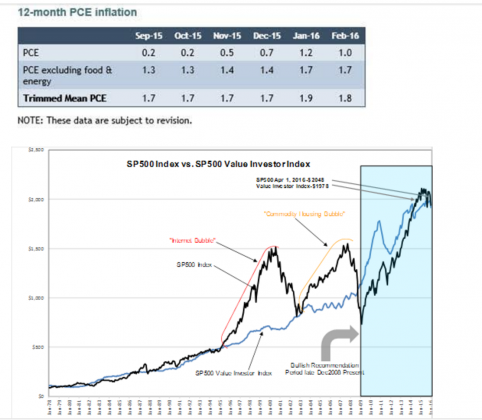“Davidson” submits:
There is nothing from my perspective to argue about our economic trends since 2009. The trends continue higher with employment hitting new highs, 246,000 added to the March Household Survey, vehicle sales continue at record levels, 17.1 March SAAR (Seasonally Adjusted Annual Rate) and the Dallas Fed 12mo Trimmed Mean PCE for Feb reported at 1.8%. The SP500 Value Investor Index at $1,978 vs SP500 at $2,048 remain within 5% of each other which historically indicates that, even with the wild swings we have encountered the past several years, market speculation remains at muted levels.

While current economic activity reflects decent uptrends, pessimism remains, but there are signs that some may be turning more positive. A psychological swoon found its low early February 2016, as I pointed out in a recent note. One can see in the employment trend that one of the most fundamental measures of the direction of economic activity ignored February’s swoon. This is how one separates out false market psychology fears of recession vs those which are driven by economic activity. There remain several prominent investors still forecasting economic collapse in 2016 with more than 30% declines in market prices. Some even forecast a Dow Jones at 5,000, a huge decline from the 17,600 level today. One can never say that these forecasts will not occur. One can only say that, when this level of pessimism differs so much from economic fundamentals, it is the fundamentals which have always forced psychology to follow. Market psychology never leads long term economic fundamentals even though it certainly impacts prices short term.
The swings in market psychology make investing a confusing process because so many who seem so successful provide their advice in the media. Almost every forecast has urgency to ‘…take action now’ and of course to give your portfolio to them and pay their fees. Had you actually followed these calls, you would have traded your portfolio at least a dozen times since 2009. Your timing would have been exceptionally poor with similar returns.













Leave A Comment